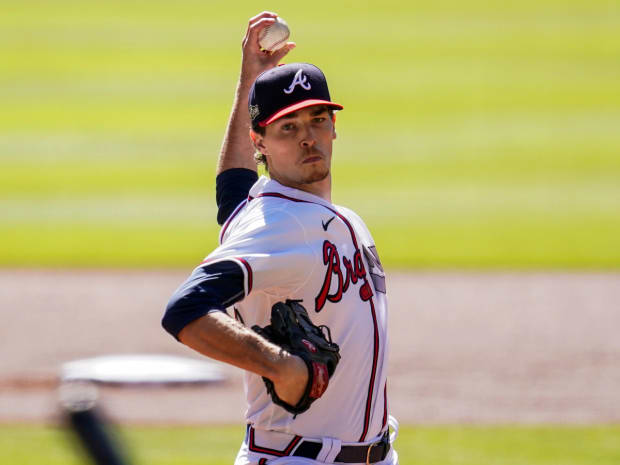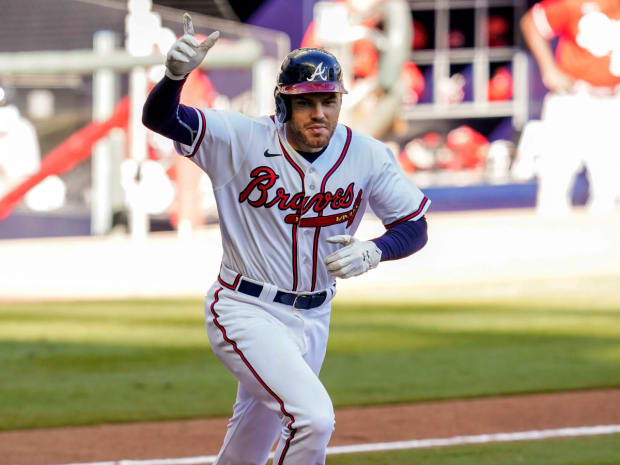The Cincinnati Reds and Atlanta Braves needed four hours, 39 minutes to score one run in Game 1 of the Wild Card Series. That's baseball in 2020.
A baseball game was scheduled for Truist Park in Atlanta Wednesday and a Bingo game broke out, or so it seemed if you’re the type who needs constant action. The Cincinnati Reds and Atlanta Braves needed four hours, 39 minutes to score one run in Game 1 of the Wild Card Series. Thirty-seven batters struck out—as many whiffs in one afternoon as in the entire 1990 World Series, the last time Cincinnati played in the Fall Classic.
A ball was put in play on average once every five minutes, 21 seconds, or the entire album version of Midnight Train to Georgia with another 43 seconds to spare.
And yet … let Braves starting pitcher Max Fried provide the proper clinical review of what transpired:
“It was a doozy.”

Here are the scores of the first eight postseason games this year: 4-1, 4-1, 3-1, 12-3, 3-1, 1-0, 5-1, 5-3. After a season in which batting average hit an all-time low in the DH era and walks, strikeouts and homers accounted for an all-time record 36% of all turns at-bat, you were expecting something else with seasons on the line?
Some runs will shake loose once we get to the five consecutive games in the Division Series and seven straight games in the League Championship Series. But with No. 1 and 2 starters and rested bullpens, the Wild Card Series is a swing-and-miss festival—46% of the batters Wednesday in Atlanta did not put the ball in play.
My kingdom for a single, which Braves first baseman Freddie Freeman provided in the 13th inning—Bingo!—to give Atlanta its 1-0 doozy of a win.
Freeman is a good place to start to explain what is going on. If you truly want to understand why so few balls are hit into play, you must understand Freeman’s day. He faced four pitchers in six plate appearances. Their 2020 rates of strikeouts per nine innings were 12.3, 12.1, 9.4 and 12.8. He saw 29 pitches, only eight of which were fastballs, and those rare fastballs averaged 96 miles per hour.
At one point Freeman grabbed his tablet, which is pre-loaded with information on pitchers, and compared it to radar readings he was seeing on the scoreboard.
“Everyone was throwing three or four miles per hour harder than they normally throw, even on our side,” Freeman said. “It’s postseason baseball.”
Back in the old days when the New York Yankees were winning championships, their hitters would talk about running up the pitch count of the starting pitcher to dip quickly into bullpens, exposing sinker-slider middlemen tossing 89 mph. These days you can drill down as deep as you want into the bullpen and you will not find any relief from extreme velocity and spin. Everyone has closer’s stuff. The soft-tossing sinker-slider guy is virtually extinct.
The last of eight Braves pitchers Wednesday, A. J. Minter, was throwing 98-mph fastballs and 86-mph cutters. The last of six Reds pitchers, Amir Garrett, has one of the nastiest sliders in baseball.
“That guy kills lefties,” Atlanta manager Brian Snitker said.

Reds manager David Bell summoned Garrett to get Freeman with runners on first and third and one out in the 13th. There was no doubt about how Garrett was going to attack Freeman: a barrage of sliders.
Here is how nasty Garrett’s slider is on left-handed hitters. Since Sept. 10, 2019, Garrett had thrown 102 sliders to lefties. Nobody got a hit off one. Not one. They were 0-for-21 against the pitch. Over the past two seasons lefties hit .084 against the Garrett slider.
Decreasing Freeman’s chances further, shadows covered the hitting area while the hitting background was bathed in sunshine on the cloudless day—the worst possible hitting environment. The ballpark lights were on but offered little help.
“You know you’ve been playing a long time,” Freeman said, “when you have a noon game and they turn the lights on.”
Bell ordered a five-man infield. Freeman looked for something even a little bit up in the zone to hit a sacrifice fly into the two-man outfield. Garrett’s fourth straight slider obliged. With an abbreviated stroke that fit the situation—just put the ball in play—Freeman served a single into centerfield for a run that was 96 batters in the making.
“This is what it’s all about in the postseason,” Freeman said. “The numbers I saw on the iPad show pitchers are throwing even harder. They have a little extra in the tank.”

The Reds’ staff led the world in strikeouts. Trevor Bauer, when he wasn’t mocking the Tomahawk chant of Braves fans or asking people to please pay attention to him (Freeman: “We noticed everything he did. That’s okay.”) was positively brilliant in how he used his variety of pitches, especially some of the nastiest breaking stuff in the game. Raisel Iglesias hit 99 mph. Michael Lorenzen was throwing 94-mph cutters.
It’s never been more difficult to be a hitter. Freeman’s day proved it, getting whipsawed from Bauer to Iglesias to Lorenzen to Garrett.
You can mock the strikeouts all you want. You can yearn for hitters who control the bat the way Tony Gwynn did. But you have to pay attention to the depth and quality of pitching, especially in the postseason, when pitchers use fewer setup pitches and rely more on their “kill” pitch.
It sounded odd to hear a 26-year-old pitcher give the game a high compliment by calling it a “doozy,” which The Farmer’s Almanac says derived from “daisy” about 100 years ago. But Fried happened to be right.
Tension can be as exhilarating as action. The game was packed with tension, especially as the Reds kept making outs on the bases when they weren’t leaving runners out there. Both pitching staffs made a tremendous amount of clutch pitches. This was an extreme version of baseball in 2020: one great arm after another keeping the ball out of play while building drama. There is more to come.
No comments:
Post a Comment